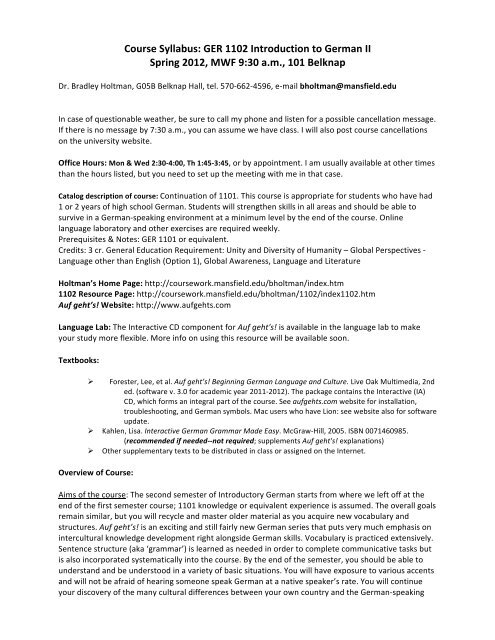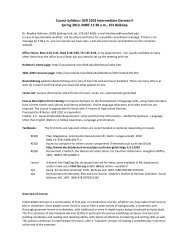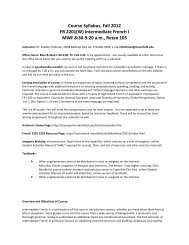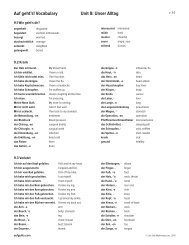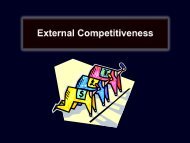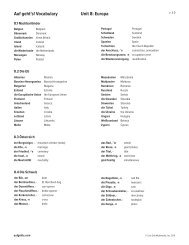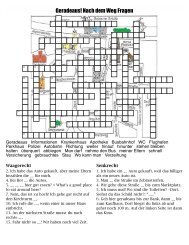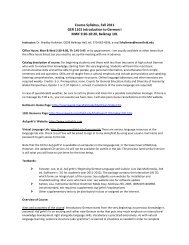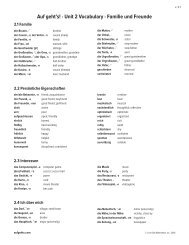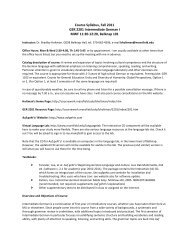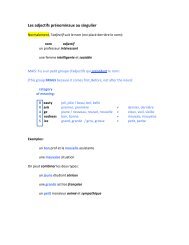Course Syllabus: GER 1102 Introduction to German II Spring 2012 ...
Course Syllabus: GER 1102 Introduction to German II Spring 2012 ...
Course Syllabus: GER 1102 Introduction to German II Spring 2012 ...
You also want an ePaper? Increase the reach of your titles
YUMPU automatically turns print PDFs into web optimized ePapers that Google loves.
countries. You will have a very good ‘feel’ for how things look in those lands, how people do things, highlights of <strong>German</strong> geography and many other insights you’ve probably never had before. And you’ll be able <strong>to</strong> express a good amount of it in <strong>German</strong>, both in writing and orally! As regards speaking, of course you cannot expect <strong>to</strong> be fluent; that takes time. But you will be confident with what you know by the end of <strong>1102</strong> at least <strong>to</strong> survive linguistically and culturally in a <strong>German</strong>-speaking environment. A few students can attain Intermediate Low on the ACTFL proficiency scale; most will remain in the Novice category. See descriptions for these levels on the ACTFL website: http://www.actfl.org/files/public/ACTFLProficiencyGuidelines<strong>2012</strong>_FINAL.pdf The curriculum of this course also teaches according <strong>to</strong> “five C’s” of the national standards for foreign language learning: Communication, Cultures, Connections, Comparisons, and Communities. For more information, see this document on the ACTFL National Standards for foreign language learning: http://www.pdfdownload.org/pdf2html/view_online.php?url=http%3A%2F%2Factfl.org%2Ffiles%2Fpublic%2FStandardsforFLLexecsumm_rev.pdf See the sections below about General Education (p. 8) for specific learning objectives and desired outcomes, including methods of assessment. These are the outcomes we explained in our application for Gen Ed status, along with some of the ways in which you will assessed. Language courses are wholistic and frequently address many objectives at the same time, in the same activity. For instance, we can practice numbers by looking at a <strong>German</strong> or Swiss phone book, which also affords us plenty of cultural information about <strong>German</strong> names, conventions for writing phone numbers and how many digits they typically have, and short dialogues that model correct phone answering behavior, wrong numbers, etc., all using the <strong>German</strong> phone book. Language learning is all about performance; you cannot remain passive and have it “applied” <strong>to</strong> you. It is an active, skill-‐building process. Therefore, virtually any activity you do in preparation for class and then during class time is an assessment of your progress. You will be asked <strong>to</strong> demonstrate various language skills through testing situations, group oral work, individual oral presentations, and targeted written tasks that are each designed <strong>to</strong> help you measure your progress. Regular compositions, for example, (see items marked with * in the schedule on a later page of this document) will help provide you evidence that your writing is developing. Reading, vocabulary, and grammar skills, along with cultural knowledge, are all demonstrated in assignments, quizzes, and tests, not <strong>to</strong> mention daily class interactions with your instruc<strong>to</strong>r and your group partners. You will also be asked <strong>to</strong> reflect on your own performance on a weekly basis. This helps <strong>to</strong> remind you of what is necessary <strong>to</strong> learn <strong>German</strong> in a classroom setting rather than being immersed in it in, say, <strong>German</strong>y or Austria. <strong>Course</strong> Materials: The Auf geht’s! Lernbuch contains only part of the texts and exercises we will use in the course. Each unit consists of an overall <strong>to</strong>pic divided in<strong>to</strong> four Themen, or <strong>to</strong>pics. You will learn vocabulary and sentence structures appropriate <strong>to</strong> dealing with the situations in the various Themen. Before working with the Lernbuch assignments, you will first practice new cultural information, vocabulary and grammar by using the Interactive Software (IA). This is designed <strong>to</strong> be colorful, clear and above all stimulating <strong>to</strong> use. Yes, you will actually have FUN doing your homework! The IA module is meant <strong>to</strong> be done primarily on your own, outside of class. It is a crucial component, since you get the necessary individual practice from it <strong>to</strong> function well in the Lernbuch and class activities based on the IA material. On my website, I will supplement the IA and the Lernbuch with additional word games, exercises, flashcards and reference <strong>to</strong>ols. There is not <strong>to</strong>o much reason <strong>to</strong> feel as though you don’t get enough practice in this course. However, don’t expect <strong>to</strong> get all needed practice during class time! Listening practice: You will also gain a lot of additional exposure <strong>to</strong> different native speakers of <strong>German</strong> from audio materials in each chapter. These will not only help you understand spoken <strong>German</strong> at a normal rate of speech, but also give you valuable “insider’s” information about the way <strong>German</strong> speakers live, DACH his<strong>to</strong>ry [‘D-‐A-‐CH’ = <strong>German</strong>y, Austria, Switzerland, from the au<strong>to</strong> symbols for each country, D, A, CH], the varied facets of <strong>German</strong> culture and the contributions of <strong>German</strong> thinkers <strong>to</strong>
virtually all fields of human endeavor. Many of the speakers also give their opinions about Americans and American culture at various points along the way. We will constantly discuss similarities and differences among American, <strong>German</strong>, Swiss, Austrian, French, and Hungarian cultures, plus others. Continue your <strong>German</strong> study: Start planning now <strong>to</strong> continue in <strong>German</strong>. After you finish <strong>1102</strong>, you will possess the most basic survival competence. See if you can plan even more in<strong>to</strong> your schedule for following semesters. Students who take 2201 and then 2202 find especially in 2202 that things begin <strong>to</strong> fall in<strong>to</strong> place and that <strong>German</strong> becomes more and more enjoyable as their abilities-‐-‐and confidence-‐-‐continue <strong>to</strong> increase. This competence through the intermediate level is actually required by more and more universities who are stressing the value of a broad liberal arts basis <strong>to</strong> the bachelor’s degree. Even this amount of competence is seen as a definite plus by potential employers, especially when you can “sell” yourself as being competent not only with the language but also with cultural understanding. But why s<strong>to</strong>p having so much fun at that point? After the intermediate course sequence, a Minor in <strong>German</strong> is within easy grasp for students who have another few semesters on campus. All you need is three additional courses beyond 2202! And you may wish <strong>to</strong> consider very seriously the possibility of studying in Jena at the Friedrich-‐Schiller-‐Universität, on MU’s exchange program. It is also possible <strong>to</strong> choose another <strong>German</strong>-‐speaking institution through the ISEP exchange structure. (As of this writing, the <strong>German</strong> major unfortunately is in mora<strong>to</strong>rium at MU and is thus not available <strong>to</strong> students. Things are not yet 100% decided about next year’s offerings, nor is the status of the minor clear at this point. Please talk <strong>to</strong> me immediately if you are interested in pursuing and minor, and also if you are interested in the idea of studying in Jena.) You will become a different person! There’s a proverb common in many cultures that says, “You are as many persons as languages you speak.” Since you have already started <strong>German</strong>, you are already at least one other person, if only in child’s form. With your continued <strong>German</strong> study, you will have a <strong>to</strong>ol that will serve you in personal communications, travel, academic research, browsing the Internet, and many other uses. In addition, you will continue <strong>to</strong> train your mind <strong>to</strong> think in another system, thereby increasing your flexibility in conceptual thinking, problem-‐solving and interpersonal capabilities. The many cultural insights you are acquiring should also serve you well in life, since you are coming <strong>to</strong> understand that there are many ways <strong>to</strong> look at the same <strong>to</strong>pic or problem and correspondingly many interpretations and solutions. In short, you are on your way <strong>to</strong> becoming a global citizen armed with a diverse palette of skills. In <strong>to</strong>day's interconnected world, we must all be aware that we are part of the whole human community and not just our own back yard. The question is not if, but when we will have contact with people from all over the world-‐-‐and much of this contact is almost certain <strong>to</strong> occur in your future work environment, if current trends continue. Why <strong>German</strong>? It’s good <strong>to</strong> remind ourselves again that <strong>German</strong> is spoken natively by over 100 million people and as a second language by millions more. It is the most widely spoken language on the European continent. It is a key language in the business world and is also vital for travel and other human interactions in central and eastern Europe and in many other countries. <strong>German</strong>y is the #1 export nation worldwide and has innumerable business ties with U.S. firms, several of them right here in Tioga County and many more throughout Pennsylvania. <strong>German</strong> is also a fantastic research language for anyone hoping <strong>to</strong> complete graduate study someday. One of every ten books published in the world is in <strong>German</strong>, including a huge body of scholarly journals and books from a culture that produced some of the finest minds in the sciences, philosophy, music, literature and virtual all other fields-‐-‐you name it. Combined with your ability in English, <strong>German</strong> will thus open many, many doors. And <strong>German</strong> speakers are some of the greatest travelers in the world, so you are very likely <strong>to</strong> meet one someday even if for some bizarre reason you never go <strong>to</strong> a <strong>German</strong>-‐speaking country! But that is a very large “if” in <strong>to</strong>day’s world of easy access <strong>to</strong> travel and study possibilities. Live your dreams! If you want <strong>to</strong> do it, you can—and will!
Hints for effective study Skill-‐building: A foreign language is a skill-‐-‐like typing, playing an instrument, painting or shooting freethrows. How well you actually PERFORM is what counts, in addition <strong>to</strong> understanding how it's done. Lots of regular practice is needed <strong>to</strong> accomplish this. Both classroom and practice outside class are thus crucial. Plan <strong>to</strong> spend at least one hour per day doing memorizing and practice work. This may sound like a lot, but you can break it up in<strong>to</strong> small chunks throughout the day. In fact, that is even preferable <strong>to</strong> one marathon study session. That way, you keep some <strong>German</strong> in your mind almost all the time, and your brain develops its own “<strong>German</strong>” area faster. The material you prepare, memorize and practice BEFORE class will be used in practical applications IN class. Class time is for your questions and extra explanation of material as well as development of oral and listening skills & cultural knowledge. Build daily study time in<strong>to</strong> your schedule. A fun way <strong>to</strong> practice your <strong>German</strong> is <strong>to</strong> have a study group that meets at regular times. Be sure <strong>to</strong> use the Auf geht’s! web site and mine for additional practice. Make a good effort. Hand in assignments on time and well done. It is not only insulting <strong>to</strong> me <strong>to</strong> be handed a sloppy, partially finished and otherwise poorly done paper, but-‐-‐more importantly-‐-‐you gain nothing from it. Trust me on this, you are not doing assignments <strong>to</strong> please me! You are doing them in order <strong>to</strong> learn <strong>German</strong> language and culture. Use your book, your CD-‐ROM and other resources <strong>to</strong> find answers <strong>to</strong> questions you might have. Don't give up and write any old thing down just <strong>to</strong> get the assignment done; you have learned nothing that way. In this (and all of your classes), you must confront and grapple with the material until you have mastered it. Even if this seems unlikely at first, keep at it. Millions have managed <strong>to</strong> do it before you, and you will succeed also-‐-‐if you give it and yourself a fair try. If all else fails, be sure <strong>to</strong> come and see me during office hours (or make an appointment <strong>to</strong> come at a different time), or drop me a quick e-‐mail message. I will respond as quickly as possible. Speak! Many people complain after, say, four years of language study in high school that they still can't speak. This can only partially-‐-‐or not at all-‐-‐be blamed on the teacher! If you don't actively practice speaking and understanding spoken <strong>German</strong>, you will not be able <strong>to</strong> do either <strong>to</strong> any effective degree. After all, can you play a Beethoven sonata on the piano just by knowing where all the notes are on the keyboard, or by simply listening <strong>to</strong> performances of it? Those things are of course necessary, but they are only first steps <strong>to</strong>ward actual performance of the music. Speaking a language is very similar-‐-‐it requires lots of practice, practice, practice. Fortunately, your CD-‐ROM for the course gives you mucho guidance and opportunities for active practice. Use it every day, and be sure <strong>to</strong> review periodically. It is also good <strong>to</strong> practice each written exercise you do several times orally. You will quickly begin <strong>to</strong> associate the spoken language with the written word this way and at the same time train your ears for listening comprehension. And you know what they say: Use it or lose it. Skills must be maintained, or they get rusty. And promise yourself that you will speak only <strong>German</strong> in group work in class! The more you allow yourself <strong>to</strong> slip and speak English even just for little comments, the less effective your practice during class time will be. Pretend no one around you understands English; <strong>German</strong> is your only option. This simulates (in a small way) what you would have <strong>to</strong> do in a <strong>German</strong>-‐speaking country. Use me as another resource. I'm here <strong>to</strong> help you! Make an honest effort <strong>to</strong> find answers yourself first, of course. The ability <strong>to</strong> find information, read reference works and directions, and generally put two and two <strong>to</strong>gether will serve you well in your career and life. But if you are really stuck, or even just mildly confused, come <strong>to</strong> see me or send an e-‐mail. Office hours are there for you <strong>to</strong> drop in at will, and no appointment is needed. I can also see you at other times if they are arranged with me in advance. You are welcome in my office, even just <strong>to</strong> chat. Keep up. Don't let yourself get behind, or it's murder <strong>to</strong> catch up again. On the other hand, if you stick <strong>to</strong> a regular study pattern, you will learn <strong>German</strong> and <strong>to</strong>ns besides! And the discipline you need <strong>to</strong> do that will carry over in<strong>to</strong> many aspects of your studies and life.
Use web resources. Aside from the Auf geht’s! site and my course page, check out the Foreign Language web page: http://www.mansfield.edu/depts/forlangu for helpful information about MU's FL programs, plus a great place <strong>to</strong> start from if you want <strong>to</strong> do some Net surfing! My home page also lists some super general resources. There are some excellent resources online, such as the LEO <strong>German</strong>-‐English dictionary (dict.leo.org). Also make the Deutsche Welle (http://www.dw-‐world.de/dw/0,2142,265,00.html) a regular s<strong>to</strong>p; it has many, many resources for learners of <strong>German</strong>. You can also read news s<strong>to</strong>ries of similar content in English at that site and then in <strong>German</strong>. However, GOOGLE TRANSLATE IS TABOO! You may be tempted <strong>to</strong> use this or one of the various translating engines out there <strong>to</strong> do your compositions and other writing for this class. While this is perfectly OK for a phrase here and there, it is NOT ACCEPTABLE <strong>to</strong> write your compositions in English, for instance, and then ‘translate’ them via the online website. This constitute academic dishonesty; you are not handing in your own work, and therefore you are misrepresenting yourself in a dishonest manner. (Furthermore, the results are often ludicrously bad.) Assignments completed in this manner are subject <strong>to</strong> disciplinary actions specified by MU’s academic integrity policy. (See the <strong>to</strong>p links at http://mansfield.edu/academic-‐affairs/resources-‐for-‐faculty/forms-‐and-‐procedures/.) Besides, the whole point of learning <strong>German</strong> (or any other subject, for that matter) is so that you can actually USE it, so you should want <strong>to</strong> be producing your own work anyway. If someone else (or a computer somewhere) does it for you, chances are you won’t remember much of it for your own skill building. It will be clear <strong>to</strong> me whether you have produced something at your current ability level or whether you’re suddently using vocabulary and grammar structures way beyond your experience. Just do your own work after making an honest effort, using what you know at that point. Sure, you will make mistakes along the way, but that’s how you learn best. <strong>German</strong> really is fun-‐-‐with a big payoff! You will have much better intercultural skills, including better ability <strong>to</strong> view your own culture more objectively. Along with this new status as a global citizen, you will have opportunities <strong>to</strong> communicate, expand your horizons, gain a real competitive edge on the job market, sharpen your thinking skills, and prepare yourself for graduate work or travel. How’s that for a bargain?!
Approximate grade breakdown: Classroom attendance (required) & oral participation*: Interactive CD homework and prin<strong>to</strong>uts: Other homework, including Lernbuch writing assignments**: Vocab/culture quizzes & chapter tests (including listening and speaking): Final exam (ch. 8 test plus material from previous chapters): 15% 20% 20% 30% 15% *Part of this grade will be your own weekly self-‐assessment: if you missed any classes, how well you prepared for and participated in classes, how much <strong>German</strong> you spoke, etc. **Lernbuch writing assignments with the paper icon are <strong>to</strong> be done on separate paper as they are assigned, not in the Lernbuch or in a notebook. Please do not hand in pages ripped out of notebooks with raggedy edges. Take pride in the work you hand in <strong>to</strong> me. General hints: Attendance & study: You are expected <strong>to</strong> attend ALL class sessions and participate actively. Only serious illness or grave situations should prevent your attendance in class. You are responsible for discussing absences with me and for obtaining makeup assignments. Do not assume you may hand in work late without discussing it with me. Call or e-‐mail BEFORE class is missed if at all possible. Take seriously the absolute necessity for thorough preparation outside of class. You need <strong>to</strong> set up a disciplined, daily study schedule in order <strong>to</strong> keep up with the work. If you practice material in a regular fashion, you should manage well. Just promise yourself now that you will not get behind! It is highly advisable <strong>to</strong> do as students in <strong>German</strong>y do: form an Arbeitsgruppe with others from your class, and/or meet regularly with a native speaker or more advanced student. Resources: There are native speakers of <strong>German</strong> on campus, plus more advanced non-‐native speakers. Meet them all, take advantage of <strong>German</strong> Club and other opportunities <strong>to</strong> use the language. If you get involved with <strong>German</strong>, it will become a part of you. Study Abroad: Have I mentioned that YOU can be one of the illustrious MU students <strong>to</strong> study in <strong>German</strong>y on our exchange program with the FSU-‐Jena? You need <strong>to</strong> have at least 2202 level-‐-‐basic functional competence-‐-‐<strong>to</strong> go on the program. Besides <strong>German</strong> instruction designed for foreigners, there are courses in other academic areas that you can take while in Jena. MU also participates in the ISEP study abroad structure, through which you are eligible <strong>to</strong> study at over 100 institutions around the world. <strong>German</strong>-‐speaking universities in several countries are represented, and you do not necessarily have <strong>to</strong> have any certain level of <strong>German</strong>, depending on the program. All credits earned on ISEP programs or the FSU-‐Jena/MU exchange transfer and count <strong>to</strong>ward your MU degree. You do not have <strong>to</strong> be majoring in <strong>German</strong> <strong>to</strong> study abroad. Finally, keep checking the DAAD website (daad.org) for the huge number of opportunities for short-‐ or longer-‐term study opportunities, internships, etc., in a large variety of fields. You can subscribe <strong>to</strong> a weekly update and not miss any chance! Many scholarships are available, but you must apply well ahead of time. Keep looking! Above all, enjoy interacting with other people in <strong>German</strong>! That's what it's really all about.
Semester Schedule: <strong>GER</strong> <strong>1102</strong>, <strong>Spring</strong> <strong>2012</strong> (subject <strong>to</strong> modification as needed) Interaktive Arbeit (IA) mit CD [do this first, then LB]. Always do Wortschatz & Grammatik of IA for each chapter! Arbeit im Lernbuch (LB) [do after IA] or other assigned work; ( ) = prepare vocab for oral activity in class Kurs (pages in Lernbuch <strong>to</strong> be practiced in class) Datum Prepare IA and LB before > > > > class time Mo, 23.1. <strong>Course</strong> intro; review; intro <strong>to</strong> geography Mi, 25.1. IA 5.1 1,2,3 LB 5.1 ABC(inLB)D; start map LB 72-‐73 Fr, 27.1. IA 5.1 4,5; Gram 1,2 LB 5.1 E(F) LB 74-‐75; map work Mo, 30.1. IA 5.1 6; Gram 2,3; prin<strong>to</strong>uts LB 5.1 G sep pap; finish map Rvw Norden, past tense Mi, 1.2. IA 5.2 1,2 LB 5.2 AB STUDY MAP! LB 76-‐77 Fr, 3.2. IA 5.2 3,4 LB 5.2 CD STUDY MAP! LB 77-‐78 Mo, 6.2. IA 5.2 5,6, prin<strong>to</strong>ut LB 5.2 D, E X-‐Cr sep paper LB 78-‐79 Mi, 8.2. 5.3 1,2 5.3 ABC STUDY MAP! 5.3: S. 80-‐81 WortschatzFr, 10.2. 5.3 prin<strong>to</strong>ut und5.3 DE (F-‐XCred) STUDY MAP! 5.3: S. 82-‐83 Mo, 13.2. 5.4 1,2 Grammatik 5.4 AB STUDY MAP! 5.4 S. 84-‐85 Mi, 15.2. 5.4 3,4 !!! 5.4 CD 5.4 S. 86-‐87 Fr, 17.2. 5.4 prin<strong>to</strong>ut 5.4 E, F sep pap STUDY MAP! Review geog, past Mo, 20.2. Review like mad Review geog, past Mi, 22.2. Review IA, LB (inc. Voc & Gram) <strong>to</strong> study for Test (know MAP!) Lektion 5 test Fr, 24.2. 6.1, 1,2,3; Gram 1,2 ABC 6.1: S. 96-‐97 Mo, 27.2. 6.1 prin<strong>to</strong>ut; Gram 1,2 D(EF) G sep paper 6.1: S. 98-‐99 Mi, 29.2. 6.2, 1,2 Wortschatz AB 6.2: S. 100-‐101 Fr, 2.3. 6.2 prin<strong>to</strong>ut und C(E)F G sep paper 6.2: S. 102-‐103 Mo, 5.3. 6.3, 1,2,3; Gram 3 Grammatik AB(C)DE 6.3: S. 104-‐105 Mi, 7.3. 6.3 prin<strong>to</strong>ut; Gram prin<strong>to</strong>ut !!! FGH I X-‐Cr sep paper 6.3: S. 106-‐107 Fr, 9.3. 6.4, 1,2 ABC 6.4: S. 108-‐109 <strong>Spring</strong> Break, 10-‐18 March, NO CLASSES Mo, 19.3. 6.4 prin<strong>to</strong>ut (DE)F G X-‐Cr sep paper 6.4: S. 110-‐111 Mi, 21.3. Review IA & LB 6, including Wortschatz and Grammatik sections Lektion 6 test Fr, 23.3. 7.1, 1,2; Gram 2 (rvw dative) ABC(D)E 7.1: 112-‐113 Mo, 26.3. 7.1 prin<strong>to</strong>ut F(H)I J sep paper 7.1: 114-‐115 Mi, 28.3. 7.2, 1,2,3,4 AB(C)D(E) 7.2: 116-‐117 Fr, 30.3. 7.2 prin<strong>to</strong>ut; Gram 1,3, prin<strong>to</strong>ut FG(H) I X-‐Cr sep paper 7.2: 118-‐119 Mo, 2.4. 7.3, 1,2,3,4 A(B)CD(E) 7.3: 120-‐121 WortschatzMi, 4.4. 7.3 prin<strong>to</strong>ut FGHI J X-‐Cr sep paper 7.3: 122-‐123 undFr, 6.4. 7.4, 1,2,3 GrammatikAB(C)D 7.4: 124-‐125 Mo, 9.4. 7.4 prin<strong>to</strong>ut !!! E(F), G sep paper 7.4: 126-‐127 Mi, 11.4. Review IA and LB 7, incl. Wortschatz and Grammatik sections Lektion 7 test Fr, 13.4. 8.1, 1,2 A(BD)E, C sep paper 8.1: 128-‐129 Mo, 16.4. 8.1 prin<strong>to</strong>ut FGH STUDY MAP! 8.1: 130-‐131 Mi, 18.4. 8.2, 1,2,3 WortschatzA(B)CDE STUDY MAP! 8.2: 132-‐133 undFr, 20.4. 8.2 prin<strong>to</strong>ut FGH (I for extra cr) 8.2: 134-‐135 GrammatikMo, 23.4. 8.3, 1,2,3 !!!AB(C)DE STUDY MAP! 8.3: 136-‐138 Mi, 25.4. 8.3 prin<strong>to</strong>ut FGHI STUDY MAP! 8.3: 139-‐141 Fr, 27.4. 8.4, 1,2,3 ABC(D)E(F) STUDY MAP! 8.4: 142-‐143 Mo, 30.4. 8.4 prin<strong>to</strong>ut G(H)I J extr cred 8.4: 144-‐145 Mi, 2.5. Review IA and LB 8, including Wortschatz and Grammatik Review Lektion 8 Fr, 4.5. Review! Review! STUDY MAP! Review, info on final Mittwoch, 9. Mai, 8.00 Uhr Semesterexamen: Chap. 8 test with items from previous chapters
General Education (beginning Fall 2011): Counts for General Education Unity and Diversity of Humanity: Global Perspectives, Option 1. For Option 1, at least 2 semesters of the same language are required. All courses taken <strong>to</strong> fulfill the language option will help students <strong>to</strong>: 1. reach at least Novice High in listening, speaking, reading and writing in the target language; (Novice High is a realistic objective for 1101. After taking the required two semesters for Option 1, a good many students should be able <strong>to</strong> reach the Novice High proficiency level by the end of <strong>1102</strong>. It is a goal, but not necessarily an attainable objective for all students in courses that meet only 150 minutes per week.) 2. demonstrate a minimal cultural competency in the target culture by engaging students with the ways language is embedded within cultural practices and world views; 3. experience of another language on its own terms; 4. use the target language as the primary medium of communication, specifically by using authentic materials in the target language, such as literature, news, advertisements, films, and music; Ideally, courses taken <strong>to</strong> fulfill the language option will enable students <strong>to</strong>: 5. show that they can view reality from a different conceptual and/or cultural standpoint 6. demonstrate understanding of how a linguistic system shapes values and attitudes The types of activities and assignments students will complete <strong>to</strong> demonstrate the relevant desired student learning outcomes: <strong>Course</strong> component or assessment vehicle Class discussion pair work, and small-‐group activities; interactions with course materials (including interactive technologies) addressing the four language skills of reading, writing, listening, and speaking; quizzes and exams; presentations and projects. General Education Goals addressed 1, 2, 3, 4, 5, 6 1, 2, 4 1, 2, 3, 4, 5, 6 1, 2, 4, 5 1, 2, 4, 5 The instruc<strong>to</strong>r may also help students procure pen pals and possibly communicate via Skype or other interactive technologies. Other possibilities include Internet-‐based information gathering, possibly as a scavenger hunt or with the end product of a presentation <strong>to</strong> the class or a small group. Out-‐of-‐class language practice is encouraged by means of activities with language clubs and interactions with visiting foreign students. Any such activities will increase the students' skill level and cultural awareness. This course advances the overall mission of the GE Program: "The general education program promotes character, scholarship, culture, and service through broad-‐based study in the liberal arts disciplines. Attributes we seek <strong>to</strong> foster include an inquiring mind, effective communication, use of varied means of seeking truth and acquiring knowledge, a sense of global connectedness, understanding and evaluation of multiple perspectives, ethical reasoning, the exercise of civic responsibility, and the lifelong pursuit of personal growth." The course will includes all of the following overall goals of General Education:
a) substantial opportunities for oral and/or written communication, Students work almost every day in groups on communicative grammar and vocabulary exercises, encouraging the development of spoken production. Regular written assignments assure development of writing skills. b) encourage active and participa<strong>to</strong>ry learning, The nature of most class sessions is highly interactive, with instruc<strong>to</strong>r/class interactions and small group or pair activities predominating rather than lecture. and c) promote application of general education knowledge, skills, and dispositions <strong>to</strong> students’ lives outside of and beyond the university experience. Language is intertwined with culture in its many manifestations, allowing us <strong>to</strong> say that language and culture courses address <strong>to</strong> one degree or another virtually all of the General Education goals. <strong>German</strong> courses deal primarily with western culture but involve examination of non-‐western cultures as well. The following are goals furthered by language and culture instruction: • Students will acquire knowledge of western culture and its relationship <strong>to</strong> non-‐western cultures. • Students will acquire knowledge of the foundations and characteristics of educated discourses. • Students will acquire knowledge of the unity and diversity of humanity. • Students will acquire knowledge of fine arts and aesthetics. • Students will acquire knowledge of the intricate complexities of life on the planet. • Students will acquire knowledge of scientific information as it is applied <strong>to</strong> personal and social decisions. • Students will acquire knowledge of the approaches of the liberal arts disciplines. • Students will exhibit skills in critical and analytical thinking. • Students will exhibit skills in effective written and oral communication. • Students will exhibit skills in the use of more than one language. • Students will exhibit skills in inquiry and research. • Students will exhibit skills in quantitative reasoning. • Students will exhibit skills in problem solving. • Students will develop dispositions <strong>to</strong> form a coherent, independent philosophy of life. • Students will develop dispositions <strong>to</strong> make socially responsible and personally fulfilling life choices. • Students will develop dispositions <strong>to</strong> live sustainability. • Students will develop dispositions <strong>to</strong> value knowledge and continuing growth. • Students will develop dispositions <strong>to</strong> form opinions and modify positions based on evidence. • Students will develop dispositions <strong>to</strong> reason ethically and act with integrity. • Students will develop dispositions <strong>to</strong> promote social justice and peace. All courses in Global Perspectives will: • explain and analyze various components of culture and show how these components interact. examine American culture in relationship <strong>to</strong> other countries' similar and dissimilar systems. • require students <strong>to</strong> read texts and engage in writing that <strong>to</strong>tals at least 1500 words. The course also fulfills criteria that are mentioned as being ideal for a General Education course: • enhance knowledge of arts, religions, cultural traditions, and ideas of world societies, both his<strong>to</strong>rical and contemporary • refer <strong>to</strong> other disciplinary perspectives besides the course’s dominant discipline.
General Education, Global Awareness (old Gen Ed) The General Education outcomes include Thinking Skills (critical thinking, problem solving, and analysis) and Communication. These are defined and illustrated in the MU Undergraduate Catalog. Virtually all written compositions and oral presentations in this course would be acceptable evidence for Communication in the Language & Literature block. Depending on the specific assignment, any of the three thinking skills might be an appropriate outcome as well. For example, quizzes and tests are likely <strong>to</strong> test one or more of the three thinking skills and could thus be used as artifacts. All language courses, including this one, count as G courses (Global Awareness), of which you need 3 in order <strong>to</strong> graduate. This course does not count as an I (information literacy) or W (writing across the curriculum). PDE Standards Information for Prospective Teachers of <strong>German</strong> This course is not included in the <strong>German</strong> BSE, although it (or its equivalent) is a prerequisite <strong>to</strong> intermediate <strong>German</strong>. The second-‐semester course of that level, <strong>GER</strong> 2202, is officially included in the BSE major. Similar <strong>to</strong> <strong>GER</strong> 2201-‐2202, the intro course <strong>GER</strong> 1101 offers instruction that helps prepare students for all of the PDE content standards for <strong>German</strong>. The standards stipulate practice activities at the Advanced level, however. Introduc<strong>to</strong>ry <strong>German</strong> is a beginning of that process in that it teaches the same skills, but on a Novice level. MU Policy for Excused Absences Regular and punctual class attendance is expected. Documented excuses because of illness, serious mitigating circumstances, or absences because of official university representation will be accepted by all faculty, thus permitting you <strong>to</strong> make-‐up missed tests and/or assignments in a reasonable manner at the instruc<strong>to</strong>r’s discretion. In courses where classroom participation is an integral component (such as this one), your attendance is essential and may influence your final grade. If applicable <strong>to</strong> your course, the instruc<strong>to</strong>r will explain that relationship when giving criteria for evaluation during the first week of class. Academic Integrity Policy From the online MU catalog: “Students are expected <strong>to</strong> do their own academic work. Dishonesty in academic work, including cheating, academic misconduct, fabrication, or plagiarism is unacceptable. Faculty are expected <strong>to</strong> instruct students in ways of avoiding these forms of academic dishonesty. Faculty are also responsible for assessing and reporting all charges of academic dishonesty <strong>to</strong> the Office of the Provost. See policy listed at: http://mansfield. edu/academic-‐affairs/resources-‐for-‐faculty/forms-‐and-‐procedures/ under “Academic Integrity Policy.” Plagiarism is a form of academic dishonesty. You have plagiarized when you represent someone else's words or ideas as your own. If you plagiarize in this class, your offense will be reported <strong>to</strong> the Provost's Office. You are also plagiarizing if, for instance, you copy material from an Internet source and present it as your own, without crediting the original source. As noted above, translation engines, although very convenient, actually can represent a form of academic dishonesty. If you write large sections of or even entire assignments, compositions, or papers in English first and simply run them through an online translation engine, you have not actually written the text in <strong>German</strong> and are thus submitting work that is not your own. Besides, the results of these engines are often quite poor. Another point <strong>to</strong> consider is that overuse of translation engines is quite evident <strong>to</strong> your instruc<strong>to</strong>r, who knows your actual language level and can quickly observe that the translation engine has provided vocabulary and constructions that you have not yet mastered. The bot<strong>to</strong>m line is that it is always best for your own learning and most academically ethical <strong>to</strong> write directly in <strong>German</strong>. Of course you may use a dictionary (online or print) and—in limited quantity—translation engines and other <strong>to</strong>ols now available. But they should be considered resources and adjuncts <strong>to</strong> your
own writing process, not the major source of the <strong>German</strong> you submit as your own. Special fac<strong>to</strong>rs that may affect your learning Any students with documented psychological or learning disorders or other significant medical conditions that may affect their learning should work with William Chabala in our Counseling Center (143 South Hall/ Phone: 662-‐4695; e-‐mail wchabala@mansfield.edu <strong>to</strong> provide me with an appropriate letter so that I may serve their particular needs more effectively. If you have an exceptionality that requires class or testing accommodations, Mr. Chabala will work with us <strong>to</strong> identify and implement appropriate interventions.


